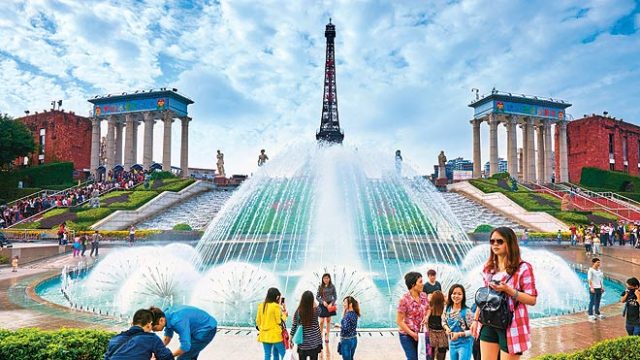How to do it
144-hour Convenient Visa
Unlike with Hong Kong and Macau, where you get a visa on arrival, you’ll need a China visa to hop across into Shenzhen. But the ‘144-hour convenient visa’ arrangement renders this less tedious. Foreign visitors to Hong Kong can travel to and stay anywhere in Guangdong province (where Shenzhen is located) for a maximum of 144 hours (or six days) provided they join a tour organised by a registered Hong Kong travel agent. Ask your hotel concierge to connect you with a travel agent. Tour fees (including visa) start at HK$800; discoverhongkong.com
What to see & do
Window of the World
It took Phileas Fogg 80 days to go around the world, but tourism authorities in Shenzhen have abridged that time to just a few hours, in a manner of speaking. This theme park showcases small-scale replicas of all the wonders of the world—and many other delights. So, in just one day, you can see everything from the Eiffel Tower to the Niagara Falls to the Taj Mahal to the Pyramids… Intended primarily for local Chinese who couldn’t afford to go out and see the world (in an earlier time), it surprisingly draws tourists from far: even those who have seen the real wonders come back for this ‘world tour’ in double-quick time. Ticket price: RMB180; en.szwwco.com
Where to eat
Minghua
Even by the standards of the completely over-the-top experiences that are fairly common in China, dining at a refurbished ocean liner—on land—has to be tops. That’s what you get to do at Sea World in Shekou, in suburban Shenzhen, where the French passenger ship MV Ancerville (subsequently sold to the provincial government in Guangdong in southern China and rechristened Minghua) has been refurbished into a four-star hotel (Cruise Inn International Hotel), a Brazilian BBQ restaurant, a wine bar, a cigar house and a movie theatre. Meal for two: RMB600 upwards; +86-755-26825555.
Where to shop
Luohu Mall
For retail therapy, the Luohu Mall, right on Shenzhen’s border with Hong Kong, is hard to beat. Consider this: five expansive floors, packed to the gills with tiny shops, each selling merchandise across the spectrum—from knockoffs of famed brands to cheap trinkets—and across the price range. You get what you pay for (after spirited but good-natured haggling, of course), and caveat emptor rules apply. But this I’ll say: I bought a knockoff backpack of an international brand (for a fifth of the price of an original), which even the quality controlofficer of the company (to whom I showed it later in Hong Kong) couldn’t tell was a fake.




